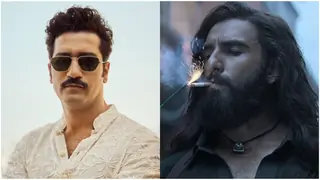Originally posted by: sashashyam
Helena: Dangerous obsessions: I was relieved to note, on closer and fuller inspection, that the young lady is not as nasally challenged as I had first assumed when I compared her to Nandini Jr. 😉Plus, being an Indian togged up in the flowing Greek robes, she speaks perfect and clear Hindi. I was so weary of trying to decipher what the (pseudo) Macedonians, especially Seleucus, were trying to articulate in our Devanagari that the moment Helena opened her mouth, I was ready to fall on her neck in sheer relief!
I also read somewhere that Helena was a lover of Indian culture even before she married Chandragupta. Maybe that is why her Hindi is so good!😉
I like the actor playing Helena. She is not very beautiful, but one would get bored watching bad actors than not-so-good-looking actors who can act well. But was she not supposed to have arrived in CGM's life much later 🤔?
She is also a woman of extremes. Her love is absolute, and she demands total reciprocity, whether from the khargosh or, later, from Malayaketu. The khargosh was left to die - and her Jo mera nahin, wo jiye ya mare, mujhe koyi faraq nahin padta! Chhoda use maine nahin, usne mujhe tha.. pretty much sums up her approach to a disloyal beloved, animal or human. Malayaketu, with his glad eye already wandering towards the wide-eyed Nandini, had better look out😉. Hell, the old saying has it, hath no fury like woman scorned. Or deluded.
She is deluded, and scorned. She is a very interesting twist to the tale.
As I watched the twin duels, a question occurred to me. Why do women have to prove their strength only in warlike pursuits, in effect becoming like a man? This is a tendency that prevails even today in offices and boardrooms - a woman trying to become one of the boys to be accepted.
Very true 👍🏼
Nandini: Same old chulbulapan: There is one thing to be said for our leading lady: she is reliable, in the sense of being the same all the time. She kept up her girlish giggling and chulbulapan during these episodes, being helped by the presence at her side of her Tun Tun bhabhi. What the latter was doing jauntering across the country when the baby looked almost due is more than I could make out, but perhaps she is not expecting at all, and is "like that only".
I always thought that she was fat, not pregnant. As far as Nandni is concerned, ever since she her marriage has been announced, the girl seems to have lost her girlish giggles. She seems to have grown up overnight.
Acting wise, she was really good the other day when she was assuring her father that she wanted to be his greatest strength and fight his enemies. The closing shot of her face was striking.
Yeah. She does well in those Pita-Putri scenes.
Chandragupta: Irrepressible bravado ?: Having clobbered Chandragupta soundly two threads back for babbling his secret plans to a strange daasi, I am now impelled, and not just out of a purely humanitarian impulse, to defend his repeat performance in Alexander's tent.
Deliberate babbling: To revert, while Chandragupta is definitely showing off when he removes those two knives from his hair and his sandal and hands them over to the guards, once inside, his otherwise irresponsible sounding remarks might, just might, have been deliberate.
See, his goal is to find out as much as he can about Alexander's plans , his battle techniques, and his overall approach to the subcontinent of Bharatbhoomi. This cannot be done by functioning as a cook in Philip's kitchen. Nor can he ingratiate himself with Helena unless he finds some way of catching her attention by standing out from the other ordinary servants. At the same time, he has to be non-confrontational and non-threatening, for otherwise he will be summarily punished.
Seen in this light, all that he does makes sense. He manages to catch the attention of the Macedonians with his paean to Chandra as a great and patriotic warrior who is hostile to foreigners - for Alexander is interested in such insider feedback . At the same time, he deflects any punishment, that such pronouncements would otherwise have attracted, away from himself, by attributing them solely to Chandra, Chanakya's pupil in Takshashila.
The end result is all that he could have wished for, as he gets the opportunity to get as close as can be managed to Helena, with opportunities ahead for capitalizing on this opening.
Yeah. It is definitely an attention-seeking ploy. And he succeeds well.
Chandragupta-Chanakya
Bhay aur bhavana: Now we finally come to the piece de resistance, the marvellous scenes between Chandragupta and his mentor. I have watched them three times back to back, and they are entrancing each time.
Part I-: Target Magadha: This segment was truly fabulous- both for the splendid lines, and for the actions and reactions of the two protagonists. It would be impossible to say, as both Chanakya and Chandragupta demonstrated anew the unique strength and the symbiotic nature of their bond, which of the two came out on top. I was struck by Chanakya's almost casual order to Chandragupta: Apne sainikon ko tayyar karo.. shastra tez karo! It thus seems that they already have some sort of army available to them, possibly drawn from the many disaffected deshbhakt sainik from both Ambhi's kingdom of Takshashila and Porus' satrapy ( after his defeat) of Kekeya, who detest the foreign suzerainty over their lands.
In fact, in the 1990 Chanakya, it was shown that even many of the Indian mercenary soldiers, whose loyalty was only to their paymaster, were so disgusted by the wanton cruelty of the foreign soldiers towards the common people of the lands they had overrun that they quit and joined the rebel forces being constituted by Chandragupta and his associates.
Yeah. He seems to be instigating the Indian soldiers in the Macedonian contingent. I wish they show this in greater detail.
It would have been useful if they had shown a map of Alexander's present Indian possessions, both directly conquered or ruled under him as satrapies, with the borders of the Mahajanapadh of Magadha also marked. But of course they did not, and so we have to manage as best as we can by ourselves.
Anyhow, all concerned - except Maha Padmanand himself and the brainless Malayaketu - seem to agree that Alexander's next target, given that Ambhi and Porus have caved in, along with, probably, a number of smaller kingdoms, would be Magadha. It is the likely collapse of Magadha that makes even the imperturbable Chanakya show, for the first time ever, fear of what might lie ahead.
As he answers Chandragupta's surprised query as to why he has contradicted his own teachings - Aapne mujhe hamesha bhavanaon ko harana sikhaya, parantu aaj aap swayam bhavanaon se haar gaye? , Chanakya's face, turned towards the fire, seems frozen, as if he could see, in the dancing flames, the dark future of his beloved Mathrubhoomi under the heel of the foreign conqueror.
Nandni tells her father when she is young - if you don't have love for your motherland, then how will you protect her, fight for her. It is the same with Chanakya too. Whether fear, love or concern, when they are channelised properly, these emotions become our strength, not our weakness.
As he turns to answer Chandragupta, his voice is soft, almost like a plea for understanding: Bhay ko harane ke liye bhavanaon ka bal aavashyak hota hai, Chandra! Prashna keval Takshashila ya Magadh ka nahin hai, prashna hai sampoorna Bharatbhoomi ki raksha ka. ... Is bhay se mujhe aur hamari mathrubhoomi ko mukt karna, yahi ab tumhara jeevan lakshya hai, Chandra.
His voice becomes more urgent, more demanding: Vachan do, Chandra, ki hamari mathrubhoomi ki mitti ke maan ki raksha karne ke liye, yadi isme milna bhi pade to bhi tumhein sweekar hai!
Then the final exhortation, the mantra by which Chanakya lives, and by which he wants his best shishya too to live and, if need be, die. Sabse pehle Mathrubhoomi hogi! Bharat maata sabse upar hogi!!
And as Chandragupta, seemingly lost in a trance of his own, does not respond, a half pleading , half disturbed appeal: Kya hua, Chandra? It is only when Chandragupta comes out of that strange reverie and murmurs: Mujhe aisa bhan hua ki main yeh sab pehle bhi sun chukha hoon.. that Chanakya's face and eyes relax in exultant relief: Iska arth hai ki maine tumhein chunkar koyi bhool nahin ki!..
It is a compliment from the CVs to the viewers that they did not, at this point, insert a flashback to the patriotic perorations of Shishunaag and Suryagupta that Chandra, then still in his mother's womb, had heard and soaked up, Abhimanyu fashion.
So the plan takes shape, to identify and attack not Padmanand's strength, but his greatest weakness. The identity of this greatest weakness is not mentioned between the guru and the shishya, but no prizes for guessing, right!😉
Then comes the grand definition of what Chanakya, and their Mathrubhoomi, both want from Chandragupta.
Magadh aur Bharat ko ek aisa raja chahiye jiski na koyi durbalta ho, aur jise na koyi bhay ho.. With a protective, affectionate arm around his protege's shoulders, Wo raja tum banoge, Chandra, kyonki tumhare pas khone ke liye kuch bhi nahin, aur paane ke liye sab kuch hai!
Time alone will tell if Nandini, now so intent on becoming her father's sabse badi shakti, will one day become the same for Chandragupta or, as Padmanand says of himself, his one and only durbalta.
Hmmm...now we know from history that Alexander's forces are unwilling to take on the Magadh forces, and hence leave India. Chandragupta and Chanakya, with the help of Parvatak, attack Magadh. Chanakya plots to eliminate Parvatak and Chandra becomes the king of Magadh. I don't know for now how Nandni fits into the scheme of things. Does Nandni eventually reject Malayketu, and hence Parvatak's decision of supporting Chandra's army (i.e., if the show borrows it's plot from Mudra Rakshasa)? With Helena and Nandni, I am curious how the story will unfold.
Part II: Target Alexander: One has to note that Chanakya never overreaches himself; he has his feet always firmly planted on the ground of reality. So he does not dream of defeating and destroying Alexander, only of dissuading him for going deeper and deeper into Bharatvarsh, and instead deciding to go back home to Greece. For this, humein uski vijay yatra ko rokhna hoga.
To achieve this goal, Chanakya intones to his attentive pupil, they have to learn about both Sikandar's strengths and his weaknesses, uske daav pech, uski soch, uski ran neeti, and for this, tumhein uski shivir mein jaana hoga. .. Uski shivir se tumhari wapasi hi Sikandar ki waapse sunischit karegi!
Chandragupta's response is a proud affirmation of his confidence in himself, and in his ability to meet his guru's expectations: Main avashya lautoonga! Aur Sikandar ko bhi lautna hoga!
And the depth of affection and faith that Chanakya has in his shishya seeps thru in his parting blessing : Safal hokar lautna, Chandra!
NB: There is one version of pre-Mauryan history where Chandragupta actually goes to Alexander's camp to invite him to attack Magadha. He is dismissed and barely escapes being executed, the real Alexander not being anything like as benign as this one, and subject to drunken rages. The Greek historians called Chandragupta Sandrocottos.
Yeah. I have heard this version. Till around 1793, historians knew about Sandrocottos mentioned in the Greek sources, but didn't know that he was Chandragupta Maurya. Eventually in 1793, Sir William Jones, made an accidental discovery while reading Mudrarskshasa that Sandrocottos could be Chandragupta Maurya (which was later proved true). And Arthashastra was found even later in the 1900's, when a anonymous Brahmin handed over a few palm leaves to the then librarian of govt. of Mysore - Dr. Shamashastry. The librarian eventually translated this great work - the Arthashastra.
It is not for nothing that I wrote, in my last thread, that as of now, the only worthwhile scenes in Chandra Nandini are those between Chandragupta and Chanakya. Episode 11 proved this anew, and in spades.
OK, folks, this is it for the main episode analysis. Please do not forget to hit the Like button if you think that is warranted.
I will be posting below, a little later today, a separate and highly interesting account of the Battle of the Hydaspes (the Greek name for the Jhelum river) between Alexander and Porus. This reveals some new material that reshapes our whole understanding of the outcome of the battle, and of why Alexander decided, soon thereafter, to return to Greece instead of plunging further into India. Please do not miss this one!
Alexander was powerful. But his own army eventually defeated him!
See you all again on Saturday.
Shyamala/Aunty/Akka/Di


































